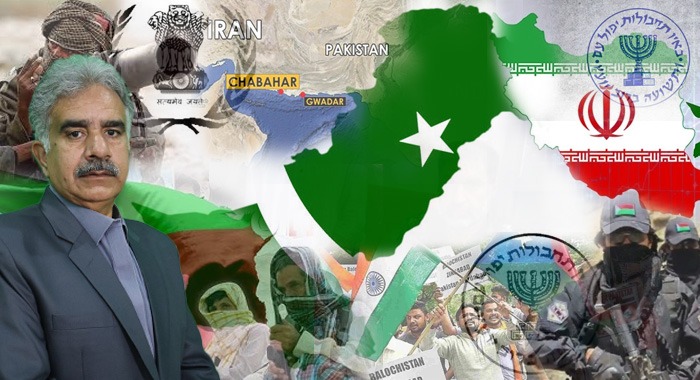In recent months, Pakistan’s security forces in close cooperation with Iranian authorities, have made substantial breakthroughs in dismantling foreign-sponsored terrorism networks operating within Balochistan and adjacent areas. The arrests of operatives linked to India’s Research and Analysis Wing (RAW) and Israel’s Mossad from Iran’s Chabahar region and Pakistan’s Balochistan have pulled back the curtain on a deeply rooted and meticulously organised campaign of destabilisation targeting Pakistan’s territorial integrity.
Among the most alarming discoveries is a digital archive referred to as Project Gidon-Esha, a joint initiative allegedly backed by RAW and Mossad, designed to sow chaos in Balochistan through proxies like the Balochistan Liberation Army (BLA) and front organisations like the Baloch Yakjehti Committee (BYC). This operation, according to intelligence sources, used Chabahar as a hub, not only for espionage but also for coordinating targeted strikes, managing propaganda campaigns, and funneling money through a complex web of smugglers, NGOs, and business fronts.
The arrest of 141 operatives in Chabahar, and the seizure of detailed plans, propaganda material, and weapon inventories, reveals a transnational architecture of hybrid warfare. These are not isolated episodes of unrest; they are calculated components of a broader geopolitical chessboard, where Pakistan’s internal vulnerabilities are being exploited to stymie its progress, particularly in CPEC and Gwadar’s development.
In Panjgur, Gwadar, and Mand, the three areas marked in red in the seized intelligence files, security forces intercepted caches of Israeli- and Indian-manufactured weapons, and unearthed drone-making factories. Moreover, financial networks such as the Zahedan-Quetta corridor, which laundered funds through fuel smuggling and black-market economies, have now been dismantled.
This financial backbone was being used to fund targeted assassinations, social media campaigns branding separatists as “missing persons,” and efforts to create an alternative Baloch nationalist identity divorced from the Pakistani state. In one notable case, an operative named Rajesh Singh, alias Ramzan, was identified as the Chief Financial Officer of this terror-financing syndicate, linking multiple NGOs, petrol stations, and even diaspora-led digital campaigns to RAW’s funding pipelines.
A crucial component of this campaign was the information war waged online. Social media trends like #FreeBalochistan and #MissingPersons were not always organically driven. Many were orchestrated through accounts based in Canada, the UAE, and the UK, operated by individuals who had falsely sought asylum abroad. These trends aimed to delegitimize Pakistan’s counter-terrorism efforts while masking the violent pasts of many “missing persons,” some of whom were later revealed to be armed commanders of BLA.
This weaponization of narrative has found an alarming echo chamber in Western human rights circles, highlighting the pressing need for Pakistan to create its own digital sovereignty and indigenous platforms capable of countering disinformation in real time.
The tide began to turn when Iran, recognising the existential threat posed by these networks, handed over critical intelligence to Pakistan. Joint operations followed, and mutual border control has improved significantly. The hanging of a RAW-linked BLA commander in Iran sent a powerful signal that Tehran, too, has recognised the double-edged sword of foreign-sponsored proxies operating in its territory.
This cross-border intelligence cooperation should now serve as a template for broader regional alignment. China, too, has vested interests in curbing the spread of instability along the CPEC corridor. Afghanistan’s Taliban government, however, remains the missing link. With the banned TTP elements still operating from its soil, despite assurances, the time has come for the Taliban to choose between strategic ambiguity and regional integration.
We are in an era where wars are no longer fought with just bullets, but with algorithms, proxy warriors, economic leverage, and propaganda. It is imperative that regional powers, particularly Iran, Pakistan, China, and Turkey, acknowledge the dual challenge of technological dependency and hybrid warfare.
Just as Iran retaliated against Israeli aggression using its indigenous missile systems, Pakistan must urgently develop self-reliant digital infrastructure and surveillance capabilities. The reliance on Western platforms and foreign hardware poses a security risk of the highest order. We must turn inward, build secure networks, and re-calibrate our policies around resilience and regional cooperation, not reactive posturing.
The Baloch Yakjehti Committee and similar entities straddle a blurry line between civil rights advocacy and ideological facilitation of anti-state narratives. While legitimate grievances exist, underdevelopment, lack of educational infrastructure, and political marginalisation, the exploitation of these frustrations by foreign hands cannot be ignored.
It is the state’s responsibility to distinguish between dissent and sedition, to empower the region’s youth through vocational training, and to deliver justice and development, not through coercion, but through inclusion.
However, this does not mean turning a blind eye to organisations that provide ideological oxygen to separatist militancy. If an individual or group refuses to recognize the Pakistani constitution and actively facilitates foreign-funded insurgencies, then they are no longer stakeholders in a democratic dialogue, they are participants in a war against the state.
Pakistan today stands at a strategic crossroads. The enemy is not just outside, it is inside our narrative space, in our digital platforms, in our financial loopholes. The RAW-Mossad nexus, now exposed, is only one node in a much larger matrix of fifth-generation warfare.
We must respond, not just with force, but with policy clarity, regional coordination, digital sovereignty, and internal reform. For Balochistan to be fully integrated, for Khyber Pakhtunkhwa to be at peace, we must invest not just in defence, but in justice, inclusion, and dignity.
This is not just Pakistan’s war. This is the region’s war. And it must be won, together.





